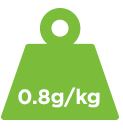Protein Primer – Part I: Protein 101
By Shannon Crocker MSc RD, Vibrant Nutrition Communications
You may have noticed when you take a read through Canadian Turkey’s Blog that we talk a fair bit about how turkey is the power protein.
We thought we’d shed a little light on exactly why turkey is that power protein. In fact, there’s so much great stuff to share about protein, that we’re bringing you a four-part protein primer.
Today’s newsletter is Protein 101. We’re talking about the basics of protein, why you need it and where you can get the quality protein you need.
What is protein?
Protein is a macronutrient (meaning your body needs a lot of it) that is key for overall good health; it is a main building block in your body and it’s part of every cell. Protein is also used as fuel (energy) to maintain basic body functions.
Protein is made up of smaller parts called amino acids. Think of amino acids as individual train cars that link together to make up a train. There are 20 amino acids that are combined in various ways to make up different proteins.
Nine of those amino acids are essential, meaning that your body either can’t make them, or can’t make them in the amounts you need. That means that you have to get these essential amino acids from food. The remaining 11 amino acids come from food but can also be made in the body.
Animal foods, like turkey, have all nine essential amino acids in amounts that your body needs, so they are called “complete” proteins and are considered high quality.
Why do you need protein?
Protein-containing foods are an important part of a nutritious diet. You need protein to build, maintain and repair your body. Protein is used to make enzymes, hormones and other compounds you need for health. Protein is also used to fuel your body,especially when you don’t get enough calories from carbohydrates or fat.
Aside from basic body functions, protein has some important health benefits, such as:
- Protein is a muscle booster. Protein helps build and maintain lean muscle mass to keep you strong.
- Protein can help crush cravings. Eating protein at meals can help you to feel satisfied and that can help you control your appetite and manage munchies.
- Protein helps with weight management. A high protein diet can promote muscle growth, calorie burning and satiety, all important for achieving a healthy weight.
We’ll talk more about protein’s health benefits in part two of our four-part Protein Primer series.
How much protein do you need every day?
The Recomm ended Daily Intake for protein for adults is 0.8g/kg. For a person weighing about 70 kg/154 lbs. for example, that would be 56 grams/2 ounces of protein. This amount is based on the minimal amount of protein needed to sustain body functions and prevent deficiency.
ended Daily Intake for protein for adults is 0.8g/kg. For a person weighing about 70 kg/154 lbs. for example, that would be 56 grams/2 ounces of protein. This amount is based on the minimal amount of protein needed to sustain body functions and prevent deficiency.
However, mounting evidence suggests that for optimal health, you need more protein than previously thought.
In fact, for muscle building, weight management and satiety, research suggests you eat about 20 to 30 grams of protein at each meal.
What are some food sources of protein?
Protein is found in varying amounts in all sorts of foods; however, it’s especially high in animal products such as turkey, eggs, fish, and Greek yogurt. Plant foods such as tofu, nuts and seeds and pulses (e.g. chickpeas, black beans) are also high in protein.
Turkey is packed with protein! Each 100-gram serving of turkey has about 30 grams of high quality protein to help you feel energized and satisfied and to help keep your muscles healthy and happy. Enjoying turkey at your meals is an easy (and delicious) way to help meet your protein needs.
Quality counts – hooray for turkey!
Protein is not just about quantity; quality also counts!
So here’s why turkey is the power protein: along with it’s 30 grams of quality protein per 100-gram serving, it’s lean (even the dark meat!) and every bite is filled with health-boosting nutrients including:
- iron (to deliver oxygen through your body)
- zinc (for a healthy immune system)
- selenium (an antioxidant mineral)
As a protein-rich food, turkey is a nutritional powerhouse.
Watch for our June newsletter where we’ll be talking more about the health benefits of protein and of course, turkey!
Sources
Institute of Medicine. Dietary reference intakes: the essential guide to nutrient requirements. Washington: National Academies Press, 2006.
Health Canada. Canadian Nutrient File, version 2010.
Gilbert JA et al. Effects of proteins from different sources on body composition. Nutr Metab Cardiovasc Dis. 2011 Sep;21 Suppl 2:B16-31.
Phillips SM, Chevalier S, Leidy HJ. Protein “requirements” beyond the RDA: implications for optimizing health. Appl Physiol Nutr Metab. 2016;41(5):565-572.



